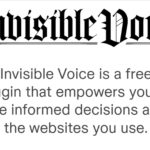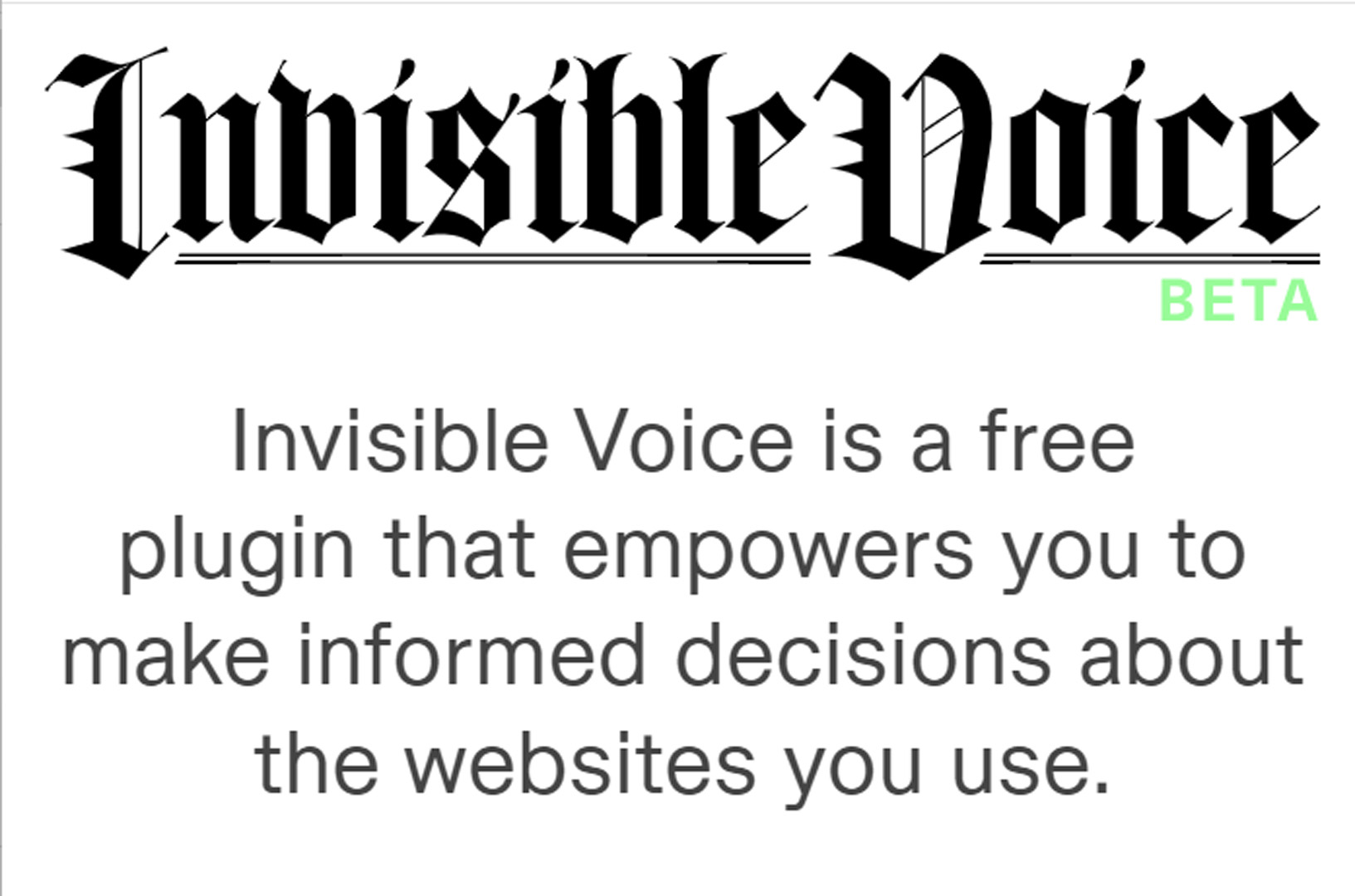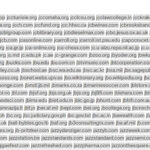“Invisible Voice” by Mark Farid
Title:
- Invisible Voice
Artist(s) and People Involved:
- Mark Farid
-
- The University of the Arts
Exhibiting Artist(s):
Symposium:
Venue(s):
Artist Statement:
Exhibition. ISEA2023 selected artwork. Nobody Sees Us Rewiring Our Communication Systems exhibition, IESA Arts and Culture School Gallery, May 23 -30
Invisible Voice is a plugin that tells you the owners, parent company, sister and affiliated companies, political leaning, revenue, employment satisfaction, legal status, controversies and news stories about the companies and individuals who own the websites you use, as you are using them.
The plug-in is updated daily, and will display information every time information on a site is updated, or you visit a site on our list for the first time. This information can easily be accessed again, by clicking the Invisible Voice icon on your screen. Invisible Voice takes less than 10 seconds to download, two clicks to install, and NO signup is asked. Invisible Voice does NOT use any cookies. [Source: YouTube]
Plugin: https://addons.mozilla.org/en-GB/firefox/addon/invisible-voice-reloaded/?
Invisible Voice #1 (2017)
a narrative about a narrative…
There are profound consequences if the chicken comes before the egg.
Individual knowledge, that is cultivated privately and never spread, exists purely for the individual. Only extremely rarely will it have any impact or reality on a collective of individuals. ‘The main means of mass communication’ – the media – exists to explain to the collective of individuals events which have happened, but also those which are yet to take place.
Consumption of media has always been a somewhat solitary exercise – newspapers were not intended to be shared, more likely thrown away after having been paid for. Then, the introduction of the radio in the 1920s brought the media directly into the home, cementing the transition from an experience shared with others to a more individual, private experience. We more and more regularly consume media alone, through once analogue and now digital mediators – as such, our consumption of politics, culture, and entertainment has become an isolated experience, existing between us and the media.
The media give us context, highlighting not only our own social classes but the functions of society in the wider world. Cultural influences, like art or film, have social influence; they teach us what is ‘cool’, how to interact with people, and even how to seduce partners. Political influences, like the news, allow us a perceived empowerment, giving the illusion of cultivating cultural and political awareness, and a sense that we have independently come to conclusions autonomously. This is a false perception. To acknowledge the authority and respect the media commands over the individual is vital.
The responsibility of the free press is to ensure that a respect for the diversity of morals exists; to give voice to minorities and disparate cultures; and, crucially, to hold politics and politicians accountable. The press is a defender of civil liberties and a challenger of the status quo; it is vital that the press remains free. According to the RSF World Press Freedom Index), in July 2016 the UK had the 38th freest press out of 180 countries, whereas the USA had the 41st, compared to 34th and 49th respectively in 2015.
However, in constantly challenging and pushing boundaries, the press also set the parameters and restrictions on what is culturally, socially, and morally acceptable. It chooses who and what to question, and it decides what we will be aware of. Fundamentally, it influences our decision-making, morality, and way of life by setting the limits on norms.
‘Life in the United Kingdom: A Journey to Citizenship’, Edition 2, 2011, is one of the required readings to claim citizenship in the UK. In it are the words of the Home Office: ‘The UK has a free press, meaning that what is written in newspapers is free from government control. Newspaper owners and editors hold strong political opinions and run campaigns to try and influence government policy and public opinion. As a result it is sometimes difficult to distinguish fact from opinion in newspaper coverage.’
In much the same way as a text can shed and change meaning in different contexts, the imagery, phrasing and framing of shots deliberately manufactures misinterpretation. To use an extreme example to highlight this, on 17th April 2015, writing for The Sun newspaper, Katie Hopkins wrote: ‘what we need are gunships sending these boats [Syrian refugees] back to their own country.’ Five months later, on 2nd September, Katie Hopkins wrote in the same newspaper: ‘today The Sun urges David Cameron to help those in a life-and-death struggle not of their making,’ attaching an image of a Syrian child who had drowned. This image alone emphasises the power of relatable imagery – the British population were swayed in the favour of allowing 20,000 Syrian refugees asylum in Britain by 2020.
In practice the free press distributes information with very little accountability – Rebekah Brooks was arrested and suspended as CEO of ‘News International’ as a result of the phone hacking scandal in 2011, but since 2015 she has been the CEO of ‘News UK’, which amounts to little more than the renaming of the original organisation. Meanwhile, the individual absorbs the media’s information often unquestioningly, rarely speaking about it.
Our relationship with political media tells us what we ‘need’ to know. To paraphrase Donald Rumsfeld – there are things we know, there are things we don’t know, and there are things we don’t know we don’t know. To decide that there is information to which the individual should not be privy is to remove autonomy from not only the individual, but from the collective of individuals who determine their actions and behaviours based on the limited information provided.”
The potential for the narrative of the reportage we are accustomed to in 2016 and 2017 to become fictionalised seems to be growing. The British people’s decision to leave the EU under false promises of £350 million a week being directed to the NHS, and Donald Trump’s progression from the media’s villainous jester to the most powerful man in the world are indicative of the real-world repercussions of the media’s spotlight. Journalists and organisations who report false and speculative headlines seem not to be held to account; ‘clickbait’ (headline grabbing stories) takes precedence and there is no acknowledgement that the media giving attention to these stories, whether in a positive or negative light, gives them credibility.
In determining our perspective, the media decide our future, as their proleptic visions become reality. We don’t own the news, in much the same way as we don’t own our history – it becomes part of the collective record.
http://invisible-voice.com https://www.markfarid.com/journal#invisible-voice]
Website:
Additional Images:
Video:
Category:
All Works by the Artist(s) in This Archive:
- Mark Farid
- More Art Events from Mark Farid in this archive:

Invisible Voice
[ ISEA2023]






